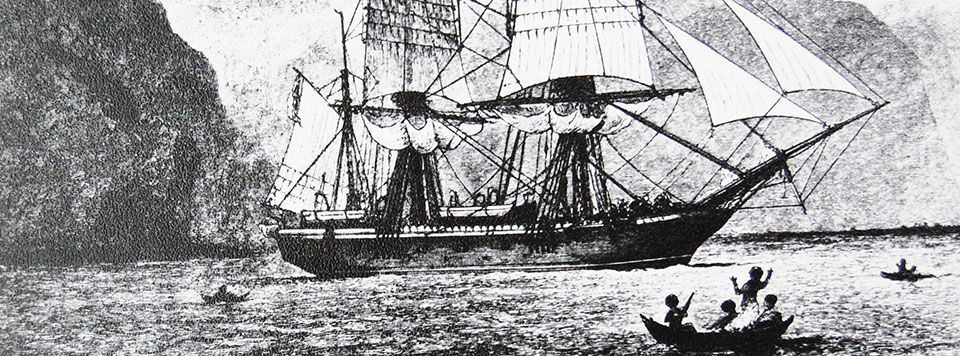A Dream of England
2009
Approaching the 200th anniversary of Charles Darwin’s birth — and also the 150th anniversary of his foundational On The Origin Of Species — I read the journals and collected letters dating from the five-year voyage of H.M.S. Beagle (1831-1836). I wanted to create a new narrative music / theatre piece, along similar lines to my previous works The Corley Conspiracy and The Rosenhan Experiment, and simultaneously to celebrate Darwin’s anniversary. After reading these texts, then, I was struck by Darwin’s prose style, and by his mention of places now familiar but then rather exotic or unknown (for example, his account of the Falkland Islands recounts a very similar episode to the Argentinian invasion of the 1980s). It is easy to imagine, reading the journal, the popularity of this book with early Victorians (it is one of the earliest examples of the now common “travel writing”).

The main themes from these texts, however, which I have taken up in A Dream Of England, are his nostalgia for England; his attitude toward slaves and colonial slavery; and his attitude toward the animals he comes across.
It is convenient today — especially given the (mis)appropriation of Darwin for all kinds of religion-vs.-science debates — to imagine Darwin as a figure who might fit well in today’s society. The journals and letters, however, paint him quite differently. He is very much a Victorian gentleman, scion of a well-off family. His belief in the virtues of England seldom waver, and over the course of his voyage, his nostalgia for home clearly grows, both in reminiscences but also in admiration for the Empire and its colonies in the southern hemisphere, and the very idea of a noble “British civilization”.
Darwin’s treatment of animals would raise eyebrows if he were a naturalist working today. His enthusasim for living creatures is coupled with an easy willingness to kill them, and to observe their mistreatment by others with a certain coldness which was shocking to this reader, at least.
The ideal of “England” and the view of animals as little more than objects form a fascinating counterpoint to Darwin’s views on slavery. Early in the voyage, he is not particularly alarmed by the slaves he comes across, and his view on “negroes” is much as might be expected from a well-off but untravelled Englishman of the time. As he travels, and sees more of the condition of the slaves, his feelings become increasingly strong. Several letters discuss the political situation in England: the British slave trade had been abolished in 1807 in Africa, the West Indies and America, but not until 1833 was a further Act was passed which covered Canada and southern Africa, banning slave ownership as well as the trade in slaves. It is the 1833 Act which Darwin discusses in his letters (and which forms part of the narrative in my work).
There is, despite his changing views on slavery, a disturbing undercurrent to Darwin’s outlook, which is summed up in his “conclusions” to the voyage. He appears to imagine a kind of hierarchy or tree of beings, with wild animals and “barbarians” (what today we might call an “indiginous people”) at the lowest level, domesticated animals and slaves at the next, with the (white) European at the top. This is certainly a proto-racist view which would obviously be unacceptable in mainstream society today — the idea that black slaves are merely tamed versions of wild blacks, worthy of treatment as faithful domestic animals but not as equal to civilized whites — and it may be an over-reading of the text on my part. It does however form an interesting comparison with the idea of evolution and the descent of man, which of course Darwin brilliantly formulated later (drawing largely on his experiences with the Beagle) as the Theory of Evolution.
The text of A Dream Of England is presented chronologically, and are drawn from Charles Darwin’s Journal of researches into the natural history and geology of the countries visited during the voyage of H.M.S. Beagle round the world, under the Command of Capt. Fitz Roy, R.N. and also The Life and Letters of Charles Darwin, Vol. 1, edited by (his son) Francis Darwin. I do not intend any change to the meaning or sense of the original context by my selections.
Characters
Charles Darwin (spoken)
Duration
45 minutes
Instrumentation
Actor, alto flute, bass clarinet, cello, piano, percussion
First performance
Performed by Radius (Adam Walker, Charys Green, Rosie Banks, John Reid, Owen Gunnell) with Raymond Blankenhorn as Charles Darwin, at Wigmore Hall, London, 18th June 2009
Listen
Request a score / parts
If you would like to see a score and/or require a set of parts for this music, please contact me.